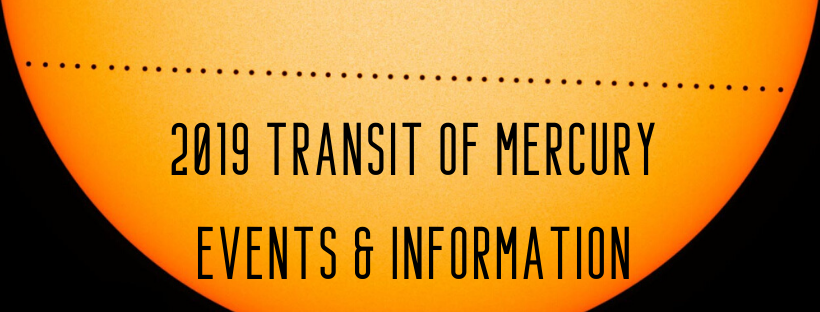Transit of Mercury across the Sun

The transit of Mercury across the Sun is coming up on Monday, Nov. 11 and we want you to be prepared for this rare event! The transit of Mercury is a unique astronomical event that will only happen 14 times this century, and the next one visible in Michigan isn't until 2049, so please join us as we celebrate and view this unique alignment!
The prequel
Please join us in the planetarium for a special lecture about Mercury and its place in our solar system (and physics history) as we get prepared for the forthcoming Transit of Mercury.
- Science Under the Dome lecture: Long Days, Short Years: The Mysteries of Einstein's Planet Mercury
- 6 p.m. Thursday, Nov. 7, WSU Planetarium
The main event
Please join the Department of Physics and Astronomy to view Mercury as it transits across the sun! We'll have several solar telescopes available. It will take Mercury several hours to cross the sun, so check back between classes to see how far it's moved. Physicists and astronomers will be on hand to answer any questions you have about the solar system. The transit of Mercury won't be visible from Michigan again until 2049 so if you have FOMO, act now!
- Solar Telescope Viewing: Transit of Mercury across the Sun
- 9:30 a.m. to 12:30 p.m., Monday, Nov. 11 Gullen Mall near the Student Center
If it's too cloudy for observations find us just inside the Student Center where we'll have a live stream and you can still check out our telescopes and learn about astronomy.
Transit of Mercury FAQ
What is the transit of Mercury and why does it happen?
The transit of Mercury happens when Mercury crosses between the Earth and the Sun during the daytime, allowing us to view the planet as a small dot going across the sun over the course of several hours. Because Mercury's orbit has a slightly different angle than the Earth's, it doesn't always appear in front of the Sun as viewed from Earth, even if we are on the same side of the Sun.
How often does a transit of Mercury happen?
The transit of Mercury happens about 14 times a century. Again, Mercury orbits the sun much faster than the Earth (it orbits every 88 days) but because of the angle of that orbit, we don't see it cross the sun each of the times we are aligned.
Why do astronomers care about the transit of Mercury?
The transit of Mercury has been important for different reasons at different times. In the 17th century Johannes Kepler predicted transits of Mercury, which supported his laws of planetary motion. In the 18th century Edmund Halley realized that transits could be used to measure the distance to the sun. This is called parallax and is now a common way that astronomers calculate distances. Most recently, Mercury has been important evidence for general relativity. Although Kepler could predict orbits well, Mercury was never quite right. General relativity accurately predicts all the oddities of Mercury. Learn more about all of this at our Science Under the Dome lecture!
Will this look like an eclipse?
No. While Mercury is about 1.5x the size of the moon, it is also about 48 million miles away from Earth, so it looks much smaller than the Sun from our location. Mercury will appear as a very tiny dot on the sun.
What planets have transits?
Only Mercury and Venus have transits because they are the only planets between the Earth and the Sun. The rest of the planets in our solar system are further away from the sun than the Earth.
When is the next transit of Mercury?
The next transit of Mercury will be in 2032, but it will not be visible from Michigan, since it will be nighttime here. The next transit of Mercury that will be visible from Michigan will be May 7, 2049.
When is the next transit of Venus?
The next transit of Venus will be in 2117, and the next one to be visible in Michigan will be in 2125. Tell your grandchildren, so they can remind their grandchildren.
Can I use solar eclipse glasses to watch this?
No, solar eclipse glasses do not have any magnification, and Mercury is so small that it will probably not be visible without magnification.
Can I just use a regular telescope to view this?
No! The sun's light is too bright and will damage your eyes. It will also be so bright that it will wash out the small planet Mercury, but most importantly, keep your eyes safe.
I won't be on campus that day, how can I see the Transit of Mercury?
Many astronomy clubs are organizing events for the transit of Mercury across the Sun. Check with your local astronomy club or library to see if something is happening. If you're not sure who to talk to, check out the clubs in the Great Lakes Association of Astronomy Clubs or this list of all state clubs.